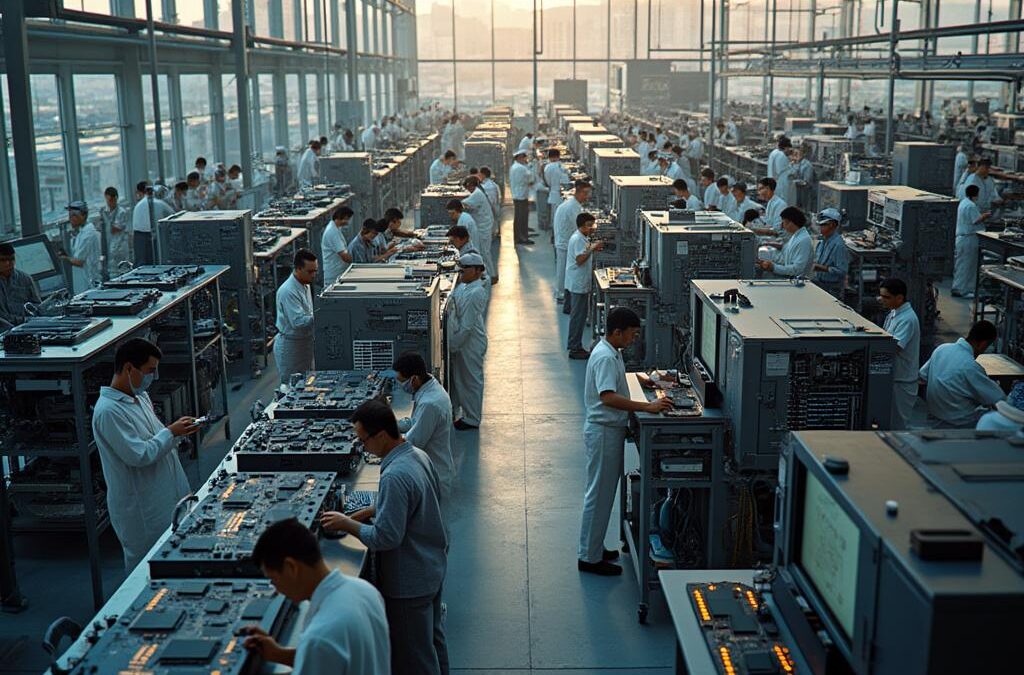Will iPhone Prices Go Up? Apple Is Investing $100 Billion in U.S. Manufacturing
Apple has made headlines with a groundbreaking announcement: a major expansion of its U.S. manufacturing efforts. The tech giant revealed plans to invest a staggering $600 billion over the next four years, with $100 billion dedicated to a new initiative called the American Manufacturing Program (AMP). This significant commitment marks a bold step in Apple’s strategy to reshore its supply chain and production processes.
The move is expected to have far-reaching implications. By bringing more of its manufacturing operations back to the United States, Apple aims to reduce reliance on overseas production. This shift could impact the cost of producing iPhones and other Apple products, raising questions about whether consumers will see price increases in the future.
Apple’s expanded investment is projected to create 20,000 new jobs directly, with thousands more anticipated across its network of suppliers and manufacturing partners. These roles span all 50 states, with major expansions planned in Arizona, California, Iowa, Kentucky, Nevada, New York, North Carolina, Oregon, Texas, and Utah. This initiative underscores Apple’s growing role as a driver of economic growth and employment in the U.S.
Apple’s American Manufacturing Program Aims to Reshape U.S. Supply Chain
The centerpiece of Apple’s announcement is the American Manufacturing Program (AMP), a $100 billion initiative designed to accelerate the reshoring of Apple’s supply chain and advanced manufacturing capabilities. Through AMP, Apple plans to incentivize its global suppliers and manufacturing partners to produce more critical components in the United States. This program is part of a broader effort to reduce dependence on overseas production and strengthen domestic manufacturing.
Apple has identified ten key American companies that will play a pivotal role in this initiative. These companies specialize in producing essential components for Apple products, ranging from semiconductors to advanced materials. By collaborating closely with these partners, Apple aims to ensure a steady supply of domestically made parts for its devices, including the iPhone.
The economic impact of this expansion is expected to be significant. While the direct creation of 20,000 new jobs is a headline figure, the ripple effect across Apple’s supplier network could generate thousands more jobs in related industries. These opportunities will span all 50 states, with major expansions planned in Arizona, California, Iowa, Kentucky, Nevada, New York, North Carolina, Oregon, Texas, and Utah. Apple already supports over 450,000 jobs in the U.S., and this investment is set to further cement its role as a major economic driver.
Interestingly, a significant portion of the components manufactured in the U.S. will not stay domestic. Approximately two-thirds of these American-made parts are expected to be exported to international markets, highlighting the global nature of Apple’s supply chain. This approach ensures that the U.S. becomes a critical hub for producing high-value components used in Apple products sold worldwide.
The announcement was made in conjunction with President Donald J. Trump, who praised the move as a step toward restoring America’s manufacturing prowess. President Trump emphasized that his administration is committed to making the U.S. the premier destination for factory construction and business growth, reversing decades of offshore manufacturing trends. Apple CEO Tim Cook also expressed gratitude for the administration’s support, reiterating the company’s commitment to American innovation and job creation.
The news has garnered widespread media attention, with outlets such as AP, Bloomberg, CBS News, CNN, and Fox News covering the announcement. Analysts are particularly focused on the potential long-term implications for U.S. manufacturing and the tech industry at large. Apple’s $600 billion investment is being seen as a landmark commitment that could inspire other companies to follow suit.
Conclusion:
Apple’s announcement to invest $600 billion, with $100 billion dedicated to the American Manufacturing Program (AMP), marks a significant shift in its strategy to reshore production and strengthen the U.S. supply chain. This initiative is expected to create 20,000 direct jobs and thousands more indirectly, while potentially reshaping the future of manufacturing in America. While the investment could lead to increased production costs, Apple has not yet confirmed whether iPhone prices will rise as a result. This move underscores Apple’s commitment to domestic manufacturing and its role as a key driver of economic growth in the U.S.
FAQ:
Will iPhone prices increase due to Apple’s U.S. manufacturing investment?
While Apple’s $100 billion investment in U.S. manufacturing could lead to higher production costs, the company has not yet confirmed whether these costs will be passed on to consumers through price increases.
What is the American Manufacturing Program (AMP)?
The American Manufacturing Program (AMP) is a $100 billion initiative by Apple to accelerate the reshoring of its supply chain and advanced manufacturing capabilities in the U.S.
How many jobs will Apple’s U.S. manufacturing expansion create?
Apple’s investment is projected to create 20,000 direct jobs and thousands more indirect jobs across its supplier network, spanning all 50 states.
What role will Apple’s U.S. partner companies play in this initiative?
Apple has identified ten key American companies specializing in critical components like semiconductors and advanced materials. These partners will collaborate with Apple to produce domestically made parts for its devices.
Will all parts manufactured in the U.S. stay in the country?
No, approximately two-thirds of the components manufactured in the U.S. will be exported to international markets, highlighting the global nature of Apple’s supply chain.
How has the U.S. government responded to Apple’s announcement?
President Donald J. Trump praised the move as a step toward restoring America’s manufacturing prowess, emphasizing the administration’s support for making the U.S. a premier destination for factory construction and business growth.

